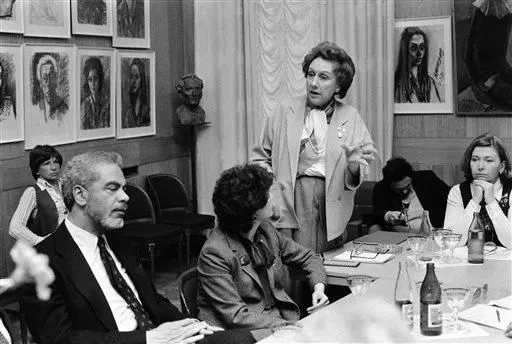
LOS ANGELES (AP) — Edith Bunker had to deal with her trying husband, Archie, and more. Here are challenges that faced the “All in the Family” character played by Jean Stapleton, who made the most of these series highlights. The actress died Friday at age 90.
— A breast cancer scare that she tried to hide from the family.
— An intruder’s attempted sexual assault, which she thwarted with a hot cake to his face.
— Fiery clashes between her liberal cousin Maude (Bea Arthur) and conservative Archie (Carroll O’Connor).
— The mood swings of menopause, which prompted her to turn the tables on Archie and tell him to “stifle!”
— Fretting that she was a kleptomaniac after absent-mindedly taking a wig from a store.
— A confrontation with Archie over his broken promise to give up gambling.
— Enduring a test of faith after a female-impersonator friend is murdered.
— The discovery that Archie was pursuing an extramarital affair.
— Losing her job after helping a woman fulfill her right-to-die wish.
— A stroke that led to Edith’s off-camera death after Stapleton decided to move on.
On Jan. 12, 1971, a skittish CBS television network premiered an unusual television show as a mid-season replacement in its primetime lineup. The sitcom, modeled on a successful British version, starred veteran actor Carroll O’Connor as Archie Bunker, a bigoted dockworker living in Astoria with his dimwitted wife, feminist daughter and liberal son-in-law.
“The program you are about to see called ‘All in the Family,’ ” read a text advisory before the show (it would now be termed a trigger warning). “It seeks to throw a humorous spotlight on frailties, prejudices, and concerns. By making them a source of laughter we hope to show — in mature fashion — just how absurd they are.” The network hired extra operators to handle a tsunami of complaints.
The reaction was not what CBS expected. It was, in fact, more of a non-reaction. The pilot episode got 15% of the viewing audience, finishing in 55th place for the week. In its first month, “All in the Family” drew about 10 million viewers a week — monster numbers now, but decidedly anemic in a broadcast era of television where a successful show drew about twice that.
Perhaps ironically, the people most interested in the show in its early months were the intelligentsia.
